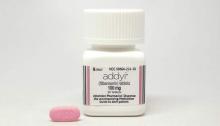A meta-analysis of eight clinical trials of the newly approved female hypoactive sexual disorder drug flibanserin show the drug yields minimal benefit, while increasing the risk of dizziness, somnolence, nausea, and fatigue to a clinically meaningful degree.
In a study published online Feb. 29 in JAMA Internal Medicine, the researchers wrote that flibanserin has not be sufficiently studied to recommend its use in clinical practice, despite being approved by the Food and Drug Administration in August 2015.
“Before flibanserin can be recommended in guidelines and clinical practice, future studies should include women from diverse populations, particularly women with (a history of) somatic and psychological comorbidities, medication use, and surgical menopause,” wrote Dr. Loes Jaspers of Erasmus University, Rotterdam, the Netherlands, and her associates.
They performed a systematic review of the literature and meta-analysis of five published and three unpublished randomized placebo-controlled trials. Seven of the trials were performed in the U.S. and Canada, while the eighth trial was performed in 13 European countries. About 90% of the 5,914 participants were white, and all were in stable, heterosexual, monogamous relationships for at least 1 year.
At baseline, the mean number of participants’ satisfactory sexual experiences per month was 2.5. The mean score on a scale of sexual desire in a daily electronic diary was 11.5 out of a possible 84 points, and the mean score on the Female Sexual Function Index was 1.8 on a scale of 1.2-6.0.
The primary efficacy outcome – the mean number of satisfactory sexual experiences per month – was 0.49 higher for women receiving 100 mg flibanserin, compared with women receiving placebo. Similarly, the mean improvement in sexual desire score in the daily diary was 1.63 points, and 0.27 points in the Female Sexual Function Index score was 0.27 points. These results remained robust across all subgroup and sensitivity analyses, and indicate that the drug affords “minimal” meaningful improvement, Dr. Jaspers and her associates wrote (JAMA Intern Med. 2016 Feb 29. doi: 10.1001/jamainternmed.2015.8565).
In contrast, flibanserin clearly influenced safety outcomes, increasing the risk of dizziness, somnolence, nausea, and fatigue to a statistically and clinically significant degree. The risk for dizziness was 4.0 times higher with flibanserin, compared with placebo. Similarly, the risk for somnolence was 3.97 times higher, the risk for nausea was 2.35 times higher, and the risk for fatigue was 1.64 times higher.
The absolute number of series adverse events was small and the risk ratio was no different between flibanserin and placebo, according to the study.
But even though the adverse events tended to be of mild to moderate intensity, it would be premature to conclude that flibanserin is safe, the researchers wrote. “In an open-label extension study including 1,723 women with a median follow-up of 1 year, 723 participants (43%) reported investigator-defined drug-related adverse events, and 143 (8.3%) reported severe adverse events. The continued safety (and efficacy) of flibanserin with long-term use remains to be established.”
Overall, the quality of the evidence in these trials was rated as “very low,” in part because of “limitations in design, indirectness of evidence, and more favorable efficacy outcomes in published compared to unpublished studies,” the researchers noted.
Dr. Jaspers and one of her coauthors work for ErasmusAGE, a center for aging research funded by Nestlé Nutrition and Metagenics. Another coauthor was involved in the European trial as an investigator. No other disclosures were reported.


